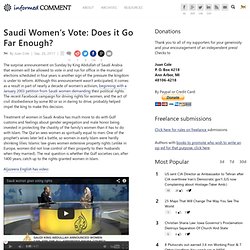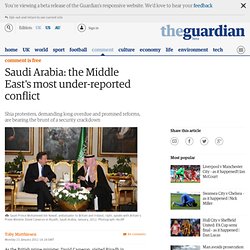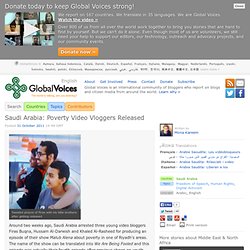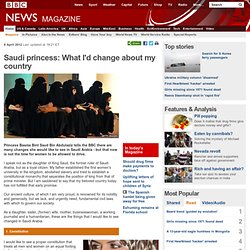

Saudi Women's Vote: Does it Go Far Enough? The surprise announcement on Sunday by King Abdullah of Saudi Arabia that women will be allowed to vote in and run for office in the municipal elections scheduled in four years is another sign of the pressure the kingdom is under to reform.

Although this announcement wasn’t anticipated, it comes as a result in part of nearly a decade of women’s activism, beginning with a January 2003 petition from Saudi women demanding their political rights. The recent Facebook campaign for driving rights for women, and the act of civil disobedience by some 80 or so in daring to drive, probably helped impel the king to make this decision. Treatment of women in Saudi Arabia has much more to do with Gulf customs and feelings about gender segregation and male honor being invested in protecting the chastity of the family’s women than it has to do with Islam.
The Qur’an sees women as spiritually equal to men. Aljazeera English has video: Gen. Shaping the Saudi state: human agency’s shifting role in rentier-state formation. Hertog, Steffen (2007) Shaping the Saudi state: human agency’s shifting role in rentier-state formation.

International Journal of Middle East Studies, 39 (04). 539-563 . ISSN 0020-7438. Saudi Arabia: the Middle East's most under-reported conflict. As the British prime minister, David Cameron, visited Riyadh in mid-January, wooing Saudi business and strengthening bilateral relations, a young Shia man in the eastern province was shot dead.

Following the kingdom's huge arms deal with the United States, Cameron apparently wanted to persuade the Saudis to buy Typhoon Eurofighters. His visit was a slap in the face for protesters, who are demanding human rights and more of a say in their country's affairs. In the week beginning 16 January thousands of people – activists say tens of thousands – took to the streets of Awwamiya in the eastern province to commemorate the death of Issam Muhammad Abu Abdallah, aged 22.
He had been shot by Saudi security forces on the night of 12 January. According to the interior ministry, the security forces were defending themselves after a police car had been attacked. These events are just the latest episodes in one of the Middle East's most under-reported conflicts. Saudi Arabia: Poverty Video Vloggers Released. Tweeted picture of Firas with his little brothers after getting released Around two weeks ago, Saudi Arabia arrested three young video bloggers Firas Buqna, Hussam Al-Darwish and Khaled Al-Rasheed for producing an episode of their show Malub Alena about poverty in one of Riyadh's areas.

The name of the show can be translated into We Are Being Fooled and this episode was actually their fourth episode after previous shows on youth and police corruption. Before the arrests, the show was having a good number of views but in few days after their arrests, it was viewed for more than 600,000 times. Here's a copy of the video, with English subtitles, from YouTube: The show's title also turned into a Twitter hashtag #Mal3ob3lena, where Saudis condemned the arrests of those three young men and also expressed their sorrow against the oppression of free speech in the kingdom. Saudi blogger Haneen wrote a post [ar] about what those three young vloggers have done: شكرا لكل من ساهم وسعى في هذه القضيه. Saudi princess: What I'd change about my country. 8 April 2012Last updated at 19:21 ET Princess Basma Bint Saud Bin Abdulaziz tells the BBC there are many changes she would like to see in Saudi Arabia - but that now is not the time for women to be allowed to drive.

I speak not as the daughter of King Saud, the former ruler of Saudi Arabia, but as a loyal citizen. My father established the first women's university in the kingdom, abolished slavery and tried to establish a constitutional monarchy that separates the position of king from that of prime minister. But I am saddened to say that my beloved country today has not fulfilled that early promise. Our ancient culture, of which I am very proud, is renowned for its nobility and generosity, but we lack, and urgently need, fundamental civil laws with which to govern our society.
As a daughter, sister, (former) wife, mother, businesswoman, a working journalist and a humanitarian, these are the things that I would like to see changed in Saudi Arabia. Continue reading the main story “Start Quote.